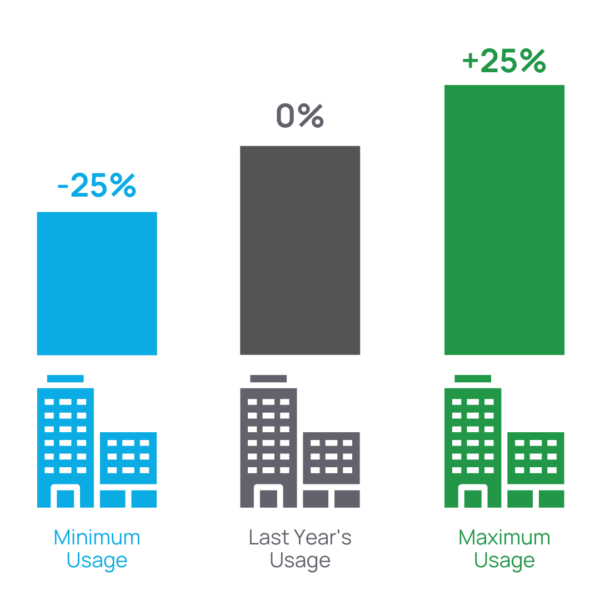At a Glance:
Energy bandwidth clauses in supply contracts are critical to understand when growing your energy broker business. Bandwidth, also known as usage swing, is the maximum/minimum amount of energy a customer can consume under a fixed-rate contract and not be penalized by the supplier. In this article, you will learn…
In this article, you will learn:
What Is Energy Bandwidth?
Energy bandwidth clauses are found in fixed-rate energy supply contracts between suppliers and customers. Bandwidth energy contract language exists in order to protect retail energy suppliers from fluctuations in the energy market.
When suppliers offer a fixed rate to a commercial customer, they are anticipating that customer’s usage based on historical data. To offer fixed rates, suppliers pre-purchase electricity or natural gas in the futures market in order to hedge their costs. To do so, energy suppliers must commit to certain volumes of energy which they anticipate the customer to use over the fixed-rate term.
If a customer happens to use more energy than expected, the supplier needs to purchase additional energy at the then market price. If that price differs significantly from the original contract price, the supplier loses money.
On the other hand, if the customer does not use the same amount of energy that was expected, the additional energy that the supplier pre-purchased gets sold back to the market at the then current price for a loss or profit.
In an effort to protect themselves from a variance in customer usage, suppliers sometimes implement bandwidth clauses into contracts that allow for a certain percentage of usage variance. Here is an example below…

- The building in the middle represents the customer’s total energy consumption for the previous 12-month period.
- The building on the right represents the total amount of energy consumption the customer can use under the fixed-rate term and not be penalized.
- The building on the left represents the least amount of energy consumption the customer can use and not be penalized.
In this bandwidth example, if the customer used more than 25% of their allotment, the energy supplier might charge them a different rate for the excess usage. And, if they use less, the energy supplier might pass through any additional costs incurred from liquidating the pre-purchased energy. Let’s explore more about how energy bandwidth is enforced below.
How Is Bandwidth Enforced?
In the case that a customer uses more or less than their bandwidth allotment, or usage swing variance, suppliers have recourse according to their individual bandwidth contract clauses.
In most cases when the customer uses too much energy, the supplier reserves the right to charge the customer the market price for the excess usage. In cases where customers use too little, suppliers will typically pass through any additional costs they incur from selling the pre-purchased energy back to the market.
These energy pass-through costs can create higher costs for consumers and force them to pay rates that are higher than expected. One way that energy customers and brokers can avoid bandwidth charge adjustments is to enroll in an energy contract that allows for 100% bandwidth swing. This means the customer can use as much or as little energy and not get penalized. 100% swing contract rates are typically higher to allow for this variance.
On the other hand, some customers have consistent energy usage and elect for contracts that have a bandwidth allotment. These contracts typically offer more aggressive rates since the supplier is able to predict costs more easily.
Why Is Bandwidth Important?
Energy bandwidth, or usage swing, is important for a variety of reasons. Bandwidth clauses allow suppliers to protect themselves against swings in the market when selling fixed rates. They also provide options to customers in deregulated states to meet their individual energy supply needs. Let’s take a look at the benefits for both suppliers and customers below…
- Energy Suppliers
- protection against a customer using more energy than the supplier has pre-purchased in the futures market
- protection against a customer not using all of the energy that has been pre-purchased in the futures market
- Energy Customers
- provides the option for lower energy rates if the customer can properly forecast energy usage
- provides the freedom to secure fixed rates for unlimited volumes of energy under 100% bandwidth scenarios
One of the advantages for energy consumers that have consistent and predictable energy usage patterns is to qualify for a lower electricity and/or natural gas rate. In fact, the more aggressive the bandwidth allotment, the lower the energy rate.
This is another great tool that energy brokers can utilize when negotiating with energy suppliers on behalf of their customers. If the customer is okay with a bandwidth clause in their energy contract, it can be a great way of enticing suppliers to offer lower energy plan rates.
How Should I Advise My Customers?
Advising your customers on the proper bandwidth percentages is critical to becoming a trusted energy advisor. Customers who can accurately forecast energy consumption have the advantage of entering into tighter bandwidth clauses, which many times can result in lower rates. On the other hand, customers who simply want to pay a fixed price for all energy consumed (no matter how much or how little) can take advantage of 100% swing or bandwidth clauses. To properly advise your customers, you must first determine their needs. Here is a great guide to follow:
- Customers Who Want The Lowest Rates: If your customer has the ability to properly forecast usage, choosing a lower bandwidth parameter (e.g. 10%) might be in your favor.
- Customers Who Want All-In Fixed Prices: If your customer wants to pay the same $/kWh for all kWh consumed, then pointing them in the direction of a full-swing, or 100% bandwidth clause is your best option.
- Customers Who Are Somewhere In The Middle: Customers who can’t accurately predict usage and still want lower prices are best suited with bandwidth clauses that are reasonable (e.g. 25%).
Being able to advise your customers and negotiate energy contract language is a key indicator of a reputable energy broker. And, if your customer is worried about exceeding their usage swing allotment, you can also advise them on energy efficiency strategies such as demand response, LED lighting, and HVAC upgrades to reduce peak energy demand. Overall, presenting a comprehensive energy plan makes you an invaluable resource to your customers.
Do You Need Help Deciding On An Energy Bandwidth Clause?
We have years of experience dealing with energy suppliers and understand their financial perspectives. Remember, not all energy suppliers are created equal, and we understand the best energy companies in the United States to negotiate energy bandwidth on your behalf. Contact our team today to discuss your energy needs and learn more about taking advantage of energy swing contract clauses.



